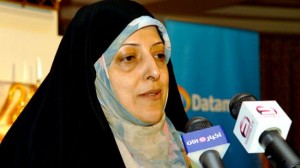 TEHRAN ��Iran plans to enlist international organizations to save Lake Hamoun, Vice President Masoumeh Ebtekar announced on Thursday.
TEHRAN ��Iran plans to enlist international organizations to save Lake Hamoun, Vice President Masoumeh Ebtekar announced on Thursday.�In line with saving Hamoun, all existing capacities at the provincial, national, regional, and international levels will be used to resolve the problems of this wetland,� Ebtekar, who is also the director of Iran�s Department of the Environment, said during a meeting with the governor of Sistan-Baluchestan Province in which reporters were also present.
Lake Hamoun is a shallow and marshy lake located in the Sistan region of eastern Iran, near the border with Afghanistan. It is fed by the Helmand River, which starts in the Hindu Kush mountains in Afghanistan.
Ebtekar thanked the people of the Sistan region for forming a human chain to bring attention to the dying lake.
She said she was happy that the people of the province are paying special attention to the environment, adding that this will increase provincial and national officials� motivation and sense of responsibility to save Lake Hamoun.
�The Department of the Environment and government officials will spare no effort to bring Hamoun back to life,� she added.
Ebtekar said comprehensive studies have been carried out on ways to revive the lake, but since the issue is of international significance, the views of experts from other countries, including Afghanistan, should also be taken into consideration.
She went on to say that Iran will seek the help of the United Nations and make use of international conventions, especially the Ramsar Convention, for the restoration of the lake.
The legal aspects of the issue are also important, and Iran will hold a conference on the lake with representatives of neighboring countries in the near future, she stated.
And in an upcoming meeting between the Iranian and Afghan presidents, Iran�s share of the water will be discussed on the basis of international conventions, she said.
�I have asked the head of the United Nations Environment Program to use international capacities for reviving Hamoun,� Ebtekar added.
Like Lake Urmia, studies have been conducted on the lake, and a national plan is being drawn up which will be implemented after being ratified by the High Council of the Environment, which is headed by President Hassan Rouhani, she stated.
Ebtekar also said environmental regulations should be observed in the construction of new dams in Iran.
By Tehran Times�
The Iran Project is not responsible for the content of quoted articles.










